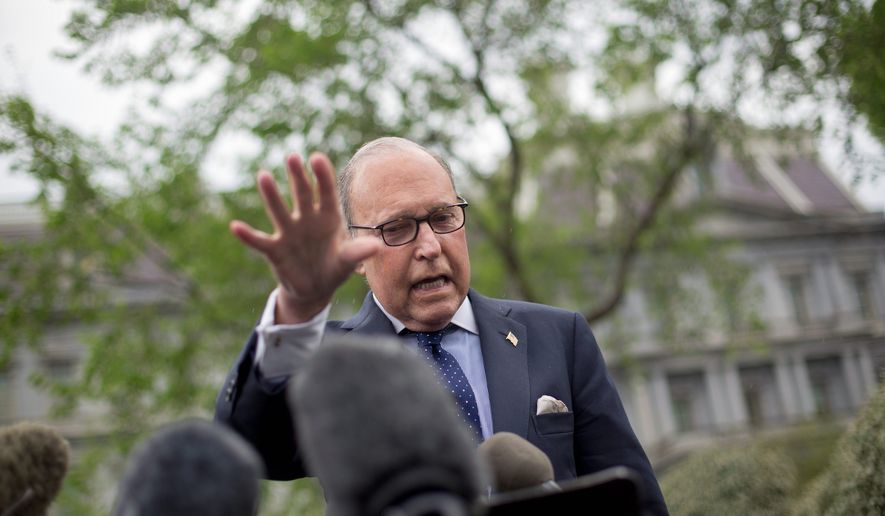Top White House economic adviser Larry Kudlow said Tuesday that it would be up to Herman Cain to withdraw from consideration to be nominated to the Federal Reserve, if the embattled former pizza chain executive and presidential candidate chooses to bail out.
“At the end of the day, it will probably be up to Herman Cain if he wants to stay in that process or not,” Mr. Kudlow told reporters. “As far as we are concerned, he is still in the process and it is proceeding.”
Four Republican senators have said they would likely vote against Mr. Cain, which would torpedo the nomination if all Democrats oppose him. President Trump has yet to formally nominate either Mr. Cain or former campaign economic adviser Stephen Moore for open seats on the Fed’s Board of Governors.
Mr. Kudlow told reporters Tuesday that the White House is interviewing other candidates for both positions.
“We are talking to a number of candidates,” he said. “We always do.”
Mr. Kudlow insisted that his comments were not meant to suggest an erosion of support for either candidate.
“Stephen Moore is in the process. We support him,” he said. “We support Herman Cain. We’ll just let things play out in the vetting process.”
In the two weeks since the president announced his intention to nominate Mr. Moore and Mr. Cain, a former Fed official, the White House has stayed mostly quiet while it vets the candidates. The president has not sent the nominations to Congress, and no strategy has been rolled out to win Senate confirmation.
Criticism arose quickly against Mr. Cain, who has been accused of sexual harassment; Mr. Cain denies the allegations. Mr. Moore, a columnist for The Washington Times, came under fire as someone who would be beholden to Mr. Trump.
But a modest groundswell of support emerged this week for Mr. Moore, even as Mr. Cain’s candidacy fades.
A group of 105 economists and conservative activists endorsed Mr. Moore this week, with many saying his non-traditional background as a commentator and Trump campaign adviser shouldn’t disqualify him for a seat on the seven-seat Board of Governors, which guides monetary policy. Among them are former Fed Vice Chairman Manley Johnson, economist Arthur Laffer and publishing executive Steve Forbes.
“The country needs people like Stephen Moore on the Federal Reserve Board to ensure that pro-growth policies are considered,” Mike Cosgrove, a business college professor at the University of Dallas, told The Washington Times Tuesday.
Timothy Loughran, professor of finance at the University of Notre Dame, said Mr. Moore would bring a needed “new perspective” to the Fed.
“There are seven seats,” Mr. Loughran said. “This is one vote. It’s really adding to the diversity of opinion and perspective.”
The group’s statement of support for Mr. Moore was one sentence, and some of those contacted to elaborate sounded lukewarm about Mr. Moore.
“It is important for the Fed to have on the board a strong supporter of market processes generally, and more specifically someone who understands, even if only instinctively, the favorable macro impacts of a serious deregulation effort,” said Benjamin Zycher, resident scholar at the conservative American Enterprise Institute. “Moore fits that description.”
Mr. Cosgrove said when the central bank raised interest rates four times last year, “Fed policy appeared to be focused on slowing economic growth to prevent the positive supply-side effects of President Trump’s tax reform from flowing through to U.S. households and businesses.”
Republican Sens. Mitt Romney of Utah, Lisa Murkowski of Alaska, Cory Gardner of Colorado and Kevin Cramer of North Dakota have said they’re likely to oppose Mr. Cain’s nomination.
The president has sharply criticized the Fed and Chairman Jerome Powell for raising interest rates four times in 2018, arguing that the moves slowed a hot economy and stock market. Mr. Trump renewed that criticism Sunday on Twitter.
“If the Fed had done its job properly, which it has not, the Stock Market would have been up 5000 to 10,000 additional points, and GDP would have been well over 4% instead of 3% … with almost no inflation,” the president tweeted. “Quantitative tightening was a killer, should have done the exact opposite!”
The fed’s increases last year raised its target interest rate range from 1.5-1.75% to 2.25-2.5%. The central bank also began a program of “quantitative tightening” in October 2017, reversing the “quantitative easing” program it began during the 2008 financial crisis. The Fed now is shrinking its balance sheet by not replacing some of its securities holdings when they mature. It has shrunk its bond portfolio by about $365 billion to $4.14 billion, according to MarketWatch.
Mr. Moore has said his non-academic background shouldn’t count against him.
“Why does it have to be that you have to have all these Ph.D. economists over at the Federal Reserve?” he said on Fox News on Sunday. “They’re the same people that made the mistake in December in raising the rates.”
• Dave Boyer can be reached at dboyer@washingtontimes.com.




Please read our comment policy before commenting.